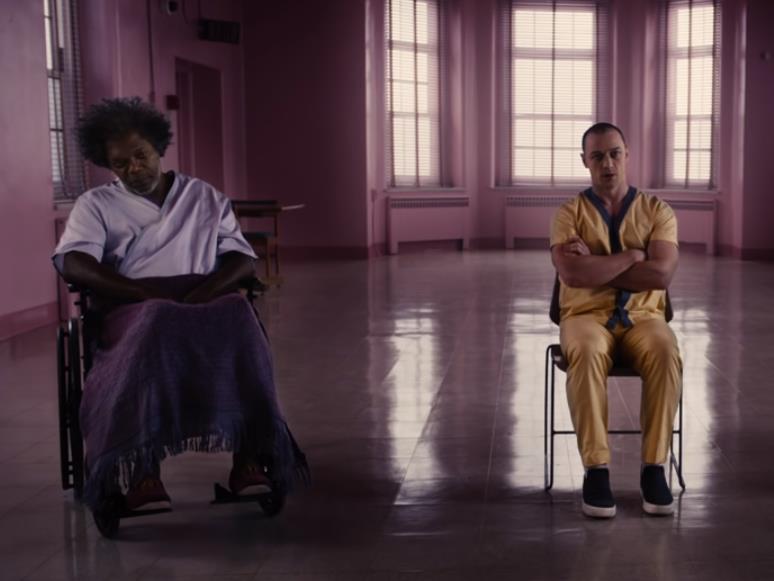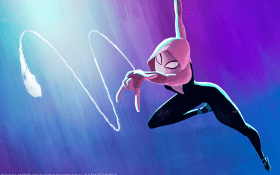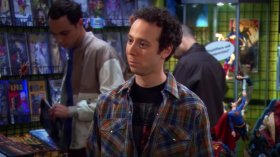Samuel L. Jackson and James McAvoy in Glass.
A sequel to Unbreakable two decades in the making, Glass delivers the shot that M. Night Shyamalan has long been dreaming of. A follow-up to the writer/director’s 2016 hit Split as well, the film uses the same frame to link his two seemingly disparate features, with Unbreakable’s David Dunn (Bruce Willis, Death Wish) and Elijah Price (Samuel L. Jackson, Incredibles 2) lined up either side of Split’s Kevin Wendell Crumb (James McAvoy, Submergence).
Placing his trio of characters in an eye-poppingly pink-hued room, Shyamalan wants viewers to notice this image. The first but not the last time these figures will share the screen in Glass, this instance is designed to stand out. Committed to a mental institution, strapped into chairs and facing the camera, the three men are united by more than their current predicament, their painful individual pasts and their possession of powers beyond usual human abilities. In a movie steeped in comic book lore, they’re a reflection of the world’s flaws and strengths all rolled into one.
As later-career features such as The Village, The Happening and The Visit have shown, Shyamalan isn’t always a subtle filmmaker. While he can be, memorably and exceptionally so with his breakout film The Sixth Sense, he can also clobber audiences over the head with his quest for meaning and his need for twists. The final chapter in his Eastrail 177 Trilogy, Glass may as well scream ‘look – they’re all together and it’s important!’; however the movie’s themes still intrigue, its world still proves immersive until its lacklustre climactic moments, and spending time with its characters still boasts many a highlight. Indeed, the feature might owe its existence to Shyamalan, but it owes its modest successes to the committed and convincing Willis, Jackson and McAvoy.
Set three weeks after the events of kidnap thriller Split, which saw Crumb and his 23 inner identities abduct three schoolgirls in the service of a beastly 24th personality, Glass finds the seemingly invincible Dunn playing kindly vigilante and the nefarious Price housed in a psychiatric facility. With help from his now-grown son Joseph (Spence Treat Clark, TV’s Animal Kingdom), Dunn tries to hunt down Crumb, who has taken another group of hostages. When their early run-in attracts law enforcement and the attention of Dr. Ellie Staple (Bird Box’s Sarah Paulson, saddled with the movie’s worst dialogue), Dunn and Crumb become patients against their will – in the same hospital that a seemingly near-comatose and wheelchair-bound Price calls home. The trio’s new doctor has a mission: convince them that they’re all suffering from ‘a specific type of delusion of grandeur’, aka that they’re not superheroes and super-villains as much as they might like to believe otherwise.
A trader in limited-edition comic book art – and a murderous, Machiavellian-level schemer, too – before losing his freedom, Price also has a plan. As he was in Unbreakable, he’s determined to demonstrate that comic books represent reality, and that their champions and antagonists walk among us. Preferring to be called Mr Glass, the childhood taunt spat his way due to his brittle, easily breakable bones, his machinations not only rankle against Staple but drive the movie’s plot towards its inevitable showdown.
Unbreakable introduced characters trying to find substance in their gifts and shortcomings, and Split explored the deep-seated consequences of trauma, with both positing that it’s the scars worn and the tragedies suffered that make someone who they are – and make them special. With the capabilities of Dunn, Price and Crumb (or The Overseer, Mr Glass and The Horde, in comic-book nickname parlance) already established and accepted, Glass flips the conceit, pondering the ramifications of simply contending that they’re ordinary. A concept presented on an intimate scale but easily extrapolated to a bigger canvas, it’s a fascinating idea that ultimately falls flat due to Shyamalan’s indulgence. His love of shock revelations, interconnected worlds and supernatural significance feels routine, although his nod to his own cameos across the trilogy raises a smile. Primarily, however, Glass works best when it embraces its status as two films in one: Crumb’s next chapter, including the return of plucky Split survivor Casey (Anya Taylor-Joy, Thoroughbreds); and Dunn and Price’s final face-off.
A mid-sized feature with big ambitions, yet made to feel smaller by boxing its story, images and characters into its primary setting, Glass feels fractured as a result. Its shards never quite fit nicely together, but each individual piece – each main player, namely – still pierces the surface enough to make an impact. Willis is stoic, sensitive and haunted, with pain simmering in his eyes. Jackson, sporting the best costuming, buzzes with the sly mood that defines his character. Still, they’re outshone by McAvoy, an actor who makes segueing between multiple personalities in a single scene look effortless. A performance on par with his work in Split, he perfects the core element that Glass lacks: finding unity from fragments.
3 stars ★★★
Glass
Director: M. Night Shyamalan
US, 2019, 129 mins
Release date: January 17
Distributor: Disney
Rated: M
Actors:
Director:
Format:
Country:
Release:





